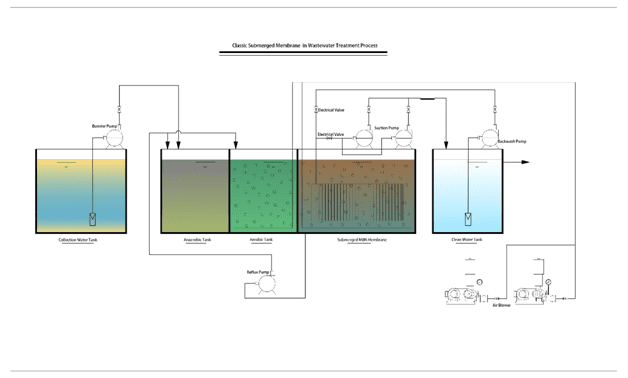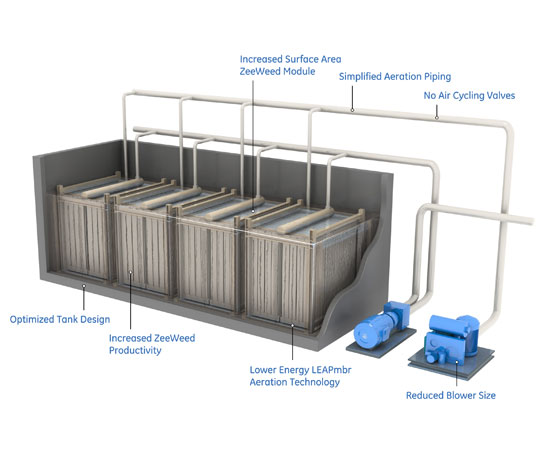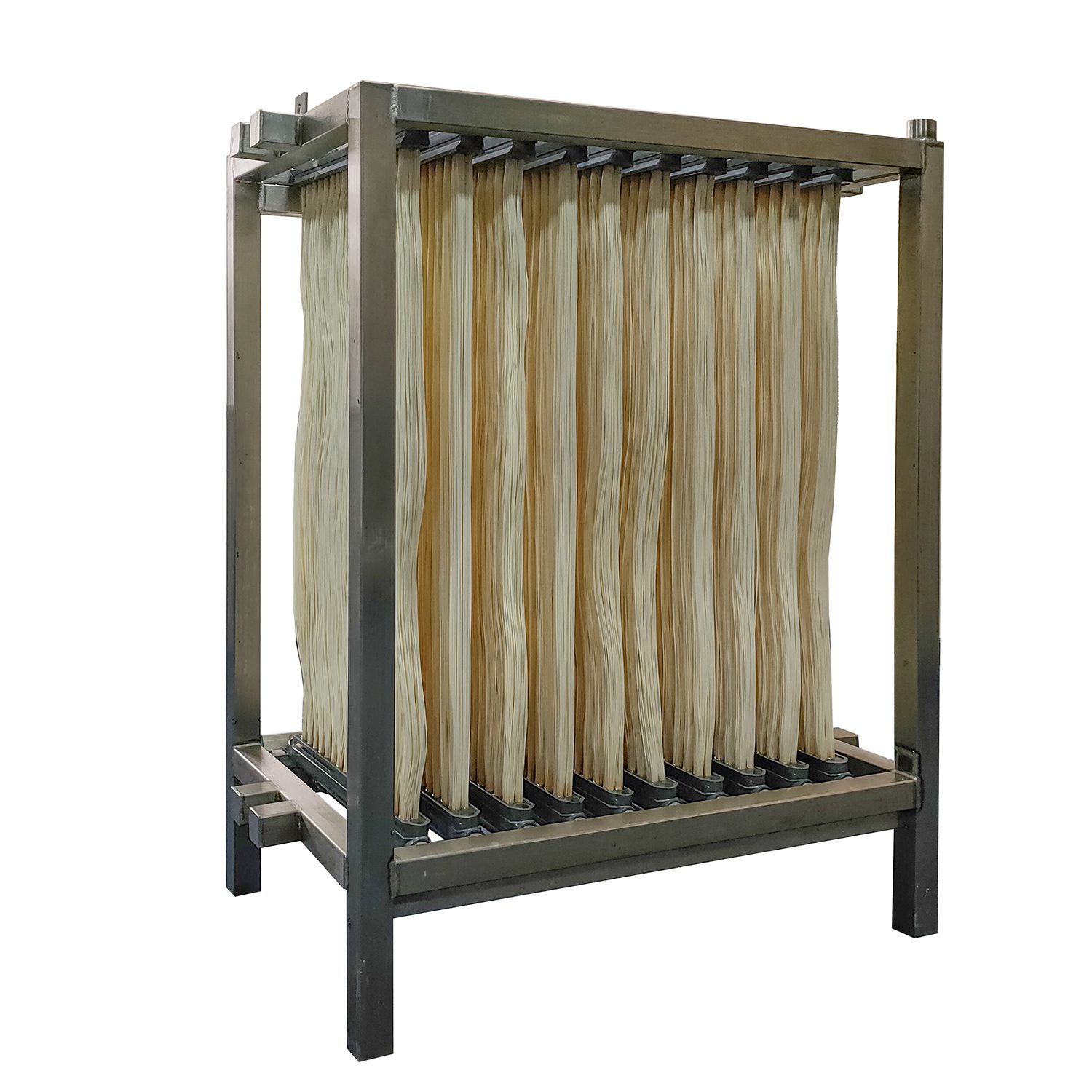The Advantages of Using a Membrane Bioreactor for Efficient Water Purification
The Advantages of Using a Membrane Bioreactor for Efficient Water Purification
Blog Article
Membrane Layer Bioreactors Discussed: Reliable Solutions for Clean Water
Membrane bioreactors (MBRs) have emerged as an advanced option for attending to the pressing obstacles of wastewater therapy - Membrane Bioreactor. By incorporating biological processes with advanced membrane layer filtering, MBRs not only enhance the top quality of cured water however also reduce the spatial needs of therapy facilities.

What Are Membrane Bioreactors?
Membrane layer bioreactors (MBRs) are innovative wastewater treatment systems that integrate organic destruction processes with membrane layer purification technology. This integration permits the efficient elimination of impurities from water, making MBRs a favored selection in various applications, consisting of municipal wastewater therapy and industrial effluent administration.

Among the important advantages of MBRs is their capability to produce high-grade effluent, frequently appropriate for reuse in irrigation or industrial processes. In addition, MBRs call for a smaller footprint compared to standard therapy systems, making them suitable for metropolitan settings where room might be limited.
Furthermore, MBRs can efficiently manage varying influent loads and are less at risk to the results of toxic shocks. These characteristics add to their expanding popularity as a sustainable option for resolving the increasing demand for clean water while reducing environmental impacts.
Just How Membrane Bioreactors Work
While the procedure of membrane bioreactors (MBRs) may appear complex, it essentially rotates around the harmony between biological processes and membrane layer purification. MBRs incorporate an organic therapy process, typically activated sludge, with a membrane splitting up device to deal with wastewater successfully.
In an MBR system, wastewater is initial introduced into a bioreactor where microorganisms degrade organic issue and other pollutants. The organic activity minimizes the concentration of contaminants while advertising the development of biomass. Following this organic therapy, the combined alcohol undergoes membrane layer purification, which can be microfiltration or ultrafiltration, relying on the wanted effluent top quality.
The membrane layers serve as a physical obstacle, permitting water and little solutes to pass while maintaining put on hold solids and bigger molecules. This enables the system to maintain a high concentration of biomass within the activator, boosting the therapy effectiveness.
Additionally, the constant separation of treated water from the biomass facilitates a compact layout and decreases the impact of the treatment facility. Overall, the mix of organic deterioration and membrane purification in MBRs leads to reputable and efficient wastewater treatment, making certain high-grade effluent appropriate for different applications.
Benefits of MBR Innovation
Among the key advantages of membrane bioreactor (MBR) technology is its ability to create top notch effluent with a dramatically lowered footprint contrasted to traditional wastewater treatment approaches. MBR systems efficiently combine organic treatment and membrane layer filtration, causing exceptional elimination of pollutants, consisting of suspended solids, virus, and organic issue. This capability brings about effluent that typically fulfills or surpasses rigorous regulative criteria for reuse and discharge.
Additionally, MBR modern technology enables higher biomass focus, which boosts the treatment effectiveness and reduces the needed activator volume. This small layout is specifically useful in urban areas where area is limited. The operational adaptability of MBR systems also implies they can adjust to differing influent qualities and flow prices, making them suitable for a variety of applications.
Furthermore, the minimized sludge production connected with MBR processes adds to decrease operational and upkeep prices. The membrane layers serve as a physical barrier, minimizing the danger of blocking and making it possible for longer functional periods between cleaning. In general, the advantages of MBR innovation make it an eye-catching remedy for lasting wastewater therapy, addressing both environmental concerns and the need for effective resource administration.
Applications of Membrane Bioreactors
With their versatility and effectiveness, membrane layer bioreactors (MBRs) discover applications throughout different markets, including local wastewater treatment, industrial processes, and also water recovery. In local settings, MBRs offer a small service for treating wastewater, effectively removing impurities while simultaneously producing high-quality effluent that meets rigorous governing requirements. This makes them especially suitable for locations with minimal area.
In industrial applications, MBR modern technology is made use of for treating process water, specifically in sectors such as food and beverage, pharmaceuticals, and petrochemicals. These sectors profit from MBRs' ability to handle high natural tons and their efficiency in recuperating valuable resources from wastewater, such as nutrients and water.
Additionally, MBRs play a crucial role in water reclamation campaigns, allowing the reuse of treated wastewater for watering, industrial procedures, and even as potable water after more treatment More Info (Membrane Bioreactor). Their efficiency in eliminating pathogens and toxins makes them a trustworthy option for making certain water high quality in numerous reuse applications
Future of Water Treatment Solutions
The future of water therapy services is positioned for transformative advancements driven by technical innovation and boosting ecological understanding. As international water scarcity ends up being a pushing issue, brand-new techniques, including membrane layer bioreactor (MBR) learn the facts here now systems, are readied to play an essential duty in improving the performance and sustainability of water treatment processes.
Arising technologies such as expert system and device discovering are anticipated to optimize treatment procedures, enabling real-time monitoring and predictive maintenance. This will boost the total reliability and effectiveness of water treatment centers. In addition, advancements in membrane materials, such as graphene and nanofiltration, guarantee to raise permeation prices and decrease fouling, bring about lower energy consumption and operational prices.
In addition, the integration of eco-friendly power resources into water treatment plants will certainly add to greener methods. The circular economy version will certainly likewise acquire grip, urging the healing of valuable resources from wastewater, such as nutrients and power.
Conclusion

Membrane layer bioreactors (MBRs) have actually emerged as a sophisticated option for attending to the pushing obstacles of wastewater treatment. By incorporating organic procedures with advanced membrane layer filtration, MBRs not just boost the high quality of cured water but also decrease the spatial needs of therapy facilities.One of the crucial benefits of membrane bioreactor (MBR) technology is its capacity to generate top notch effluent with a dramatically decreased footprint compared to standard wastewater treatment approaches.With their flexibility and performance, membrane bioreactors (MBRs) locate applications across various markets, including local wastewater therapy, commercial procedures, and also water recovery.In verdict, membrane layer bioreactors represent a substantial advancement in wastewater treatment technology, incorporating biological processes with effective membrane purification to generate premium effluent.
Report this page